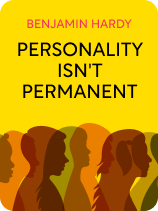

This article is an excerpt from the Shortform book guide to "Personality Isn't Permanent" by Benjamin Hardy. Shortform has the world's best summaries and analyses of books you should be reading.
Like this article? Sign up for a free trial here.
What exactly is personality? Is one’s personality fixed for life?
Most people think of their personality—the totality of their abilities, preferences, and temperaments—as something innate and unchanging. However, science shows that you can, in fact, change your personality. Moreover, the idea of a fixed personality is unhelpful because it limits what you can achieve.
Here’s why the idea of a fixed personality is problematic.
The Idea of a Fixed Personality Limits What You Can Achieve
In his book Personality Isn’t Permanent, Hardy argues that the idea of a fixed personality fosters a major self-limiting belief: Change isn’t an option. As a result, you limit your life significantly: You choose jobs, relationships, and activities that you already do and aren’t outside your comfort zone. You believe that whatever feels uncomfortable or challenging to who you are now must not be for you, and you miss out on harder but more rewarding things.
In practice, this looks like settling for a lesser position at work because the one you’d rather have is daunting, or giving up on a new hobby because it wasn’t immediately enjoyable.
| The Politics of Discomfort In The Coddling of The American Mind, authors Jonathan Haidt and Greg Lukianoff argue that the idea that you should avoid challenging, uncomfortable things has been gaining popularity in the last couple of decades. Rather than encouraging children to challenge the limits of their comfort zones, parents are increasingly trying to shield them from discomfort. The authors argue this has led to a generation of weak-minded students and young adults who feel like they can’t handle discomfort. Rather than shielding children from discomfort, the authors argue that it’s necessary for children to face—and learn to overcome—stressors and setbacks. Doing so will help them develop emotional resilience and grow into adults who don’t limit themselves to low-risk choices. |
Personality Change Is Possible
According to Hardy, science shows that your personality is not fixed and that you can change it—studies consistently demonstrate that personality traits change over the course of your life. While he contends that your past influences your personality, it doesn’t fully determine it.
In reality, your personality is largely determined by the life you live. In other words, your culture, goals, environment, job, habits, and social roles all play a part in shaping your personality. This means that as your life—the decisions you make, behaviors you engage in, and people and places you surround yourself with—changes, your personality does too. This is all good news: It means you can change the things you want to change about yourself. You aren’t stuck within the limitations of your current personality.
(Shortform note: Hardy notes that the life you live helps determine your personality, but he doesn’t clarify which kinds of life events have the greatest influence. While it may intuitively seem like large-scale, significant life events would shape your personality the most, this is inaccurate. In reality, life changes that are less dramatic—but change your long-term roles and environments—influence your personality much more. For instance, the experience of having your first child will change your personality less than the everyday process of raising your kid into adulthood.)

———End of Preview———
Like what you just read? Read the rest of the world's best book summary and analysis of Benjamin Hardy's "Personality Isn't Permanent" at Shortform.
Here's what you'll find in our full Personality Isn't Permanent summary:
- How personality is not fixed, but fluid and changeable
- How the narratives you tell yourself dictate what you’re capable of
- How to change your personality to become your optimal self






